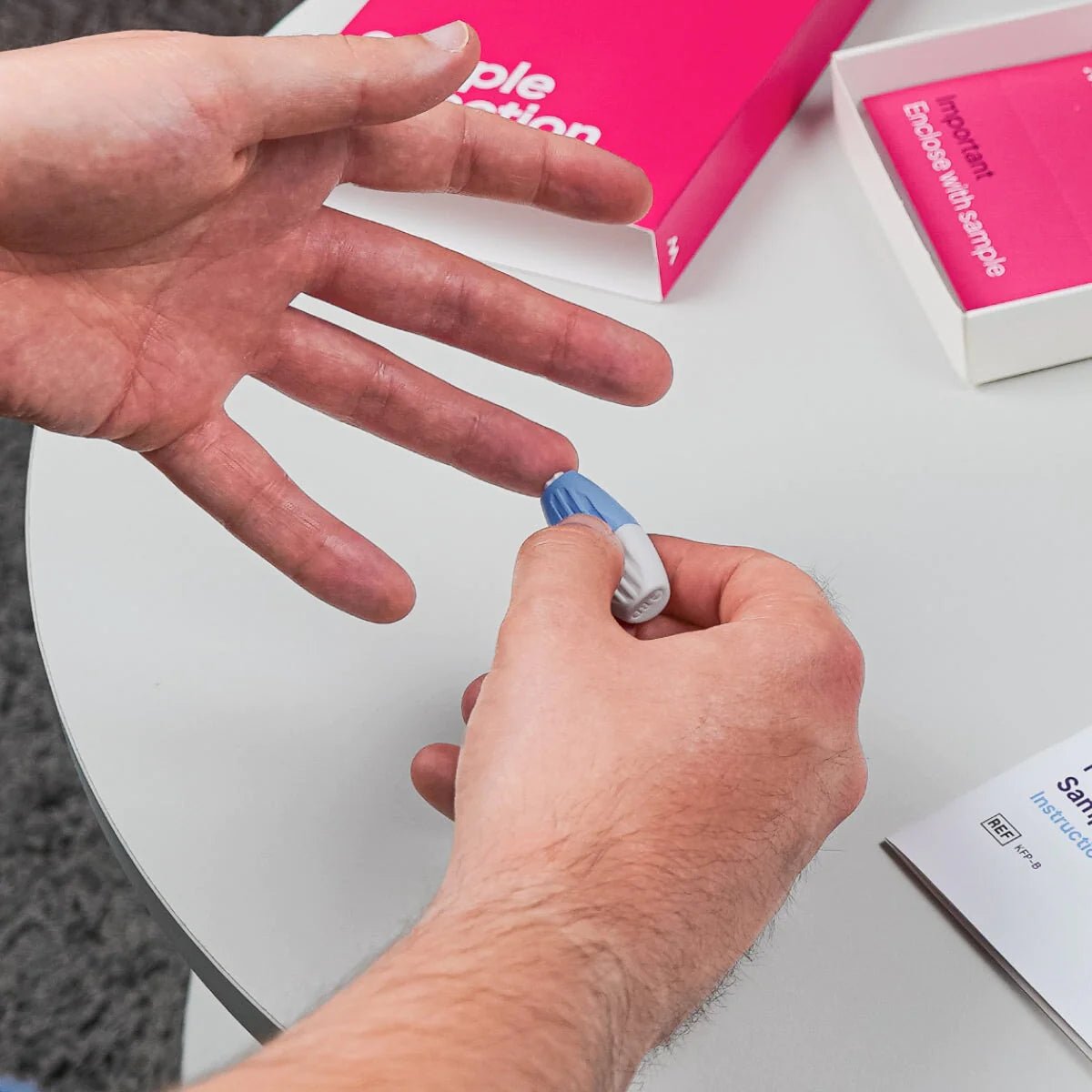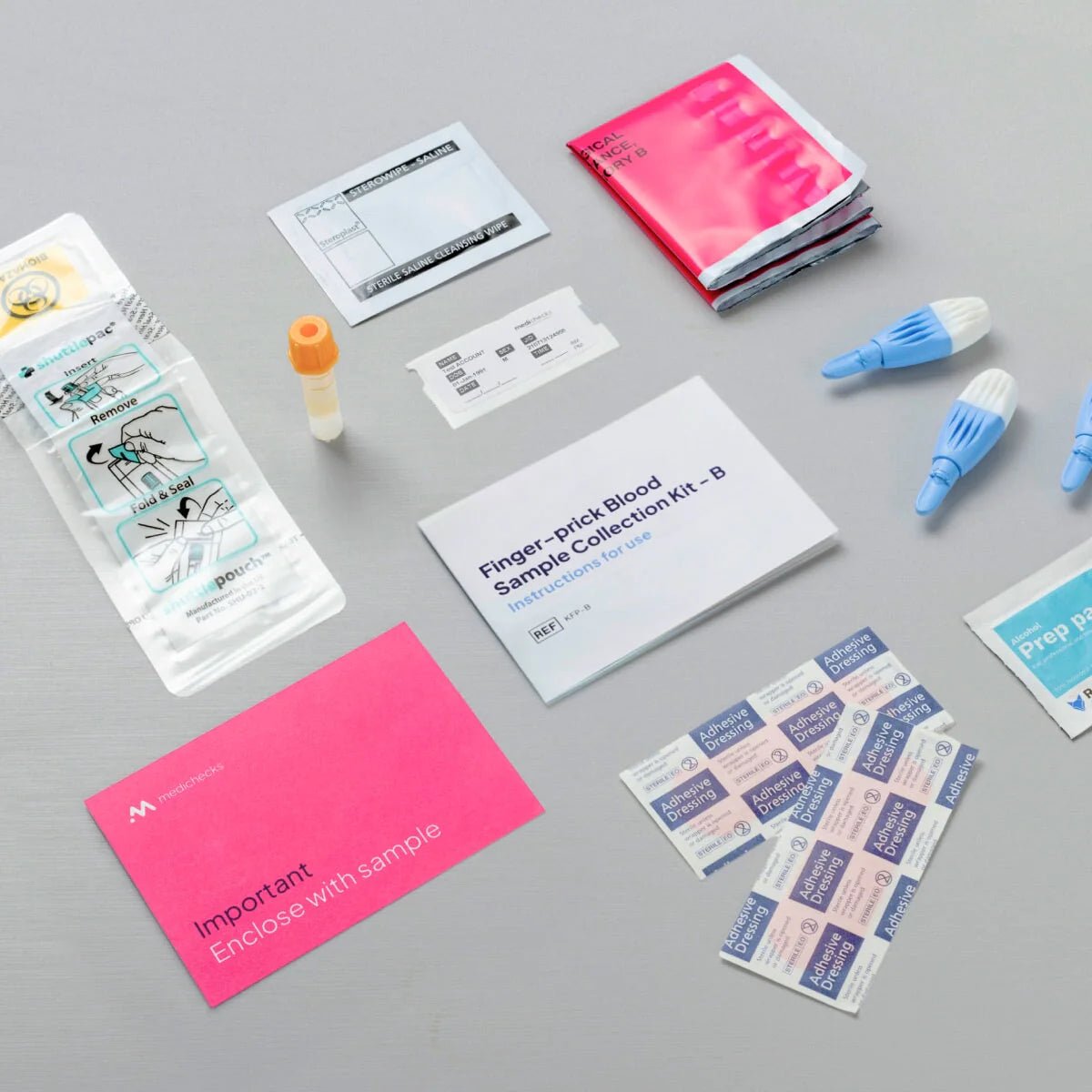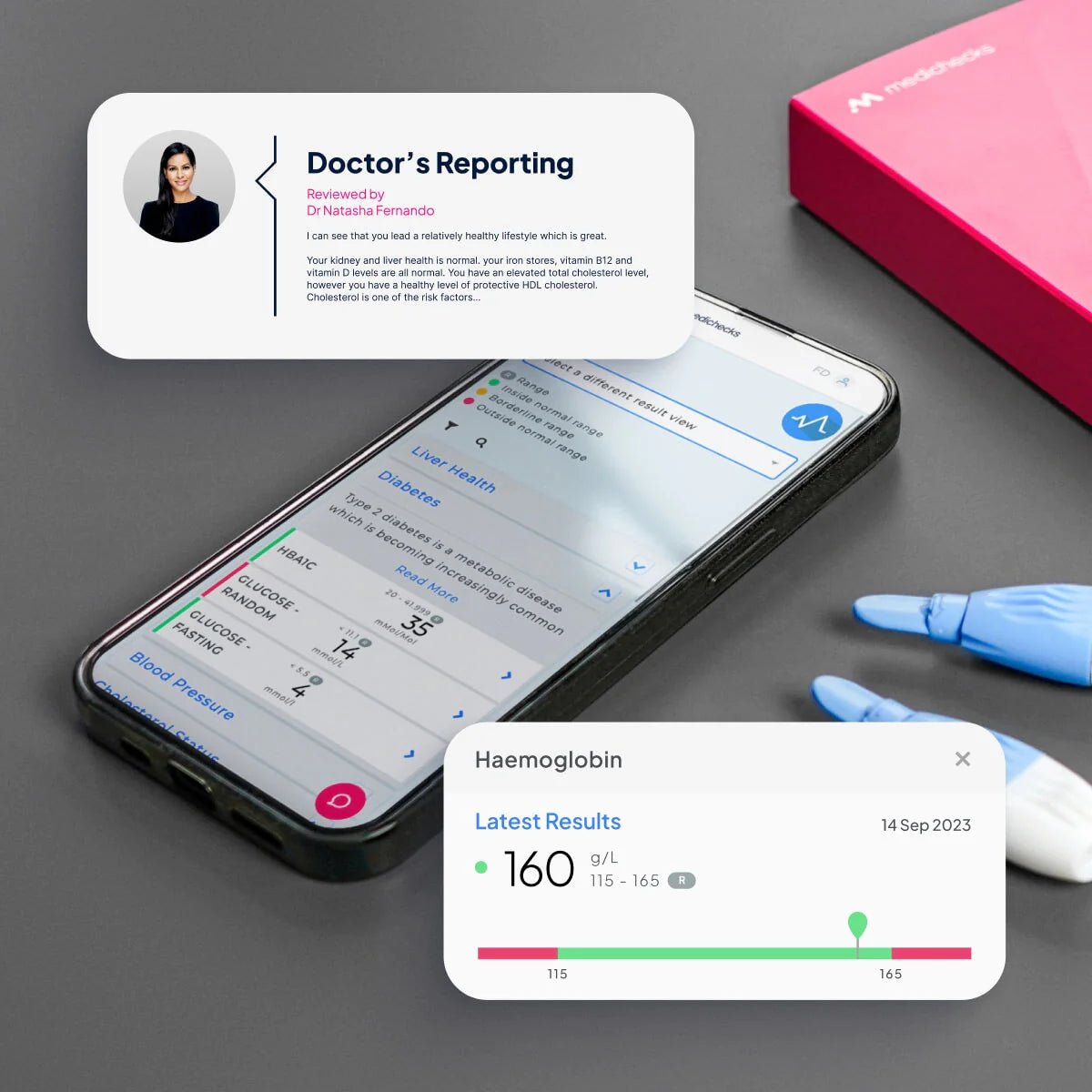CRP (High Sensitivity) Blood Test
Description
The CRP home blood test checks for chronic (long-term), low-level inflammation in your body, which is a risk factor for heart disease. It can help you explore whether lifestyle factors like an unhealthy diet, being overweight, not taking regular exercise, or smoking could be increasing your risk of inflammation. This test is sensitive enough to pick up even the lowest level of inflammation. It provides insights into your risk of cardiovascular disease and may help you take steps to improve your health, sometimes with healthy lifestyle changes.
Is it for me?
Are you concerned that lifestyle factors could be increasing your risk of inflammation? These could include an unhealthy diet, being overweight, not taking regular exercise, or smoking.
Our high sensitivity C-reactive protein (hs-CRP) test is sensitive enough to pick up even the lowest level of inflammation, which can help you build a picture of your risk of cardiovascular disease.
CRP (High Sensitivity) Blood Test, from our experts to you.
What is CRP?
C-reactive protein (CRP) is made by your liver. Its level increases in response to inflammation, as part of your body’s natural defence mechanism to fight injury or infection.
Inflammation can be acute (sudden) and temporary, and this type of inflammation is usually helpful. For example, if you cut yourself, you will usually notice signs of inflammation, such as swelling, pain, and redness.
But sometimes, the immune response can go into action for long periods, causing low-level inflammation that lasts for months, or even years (known as chronic inflammation). This type of inflammation may cause no noticeable signs or symptoms, but it can be harmful.
What is an hs-CRP blood test?
Our hs-CRP test measures your CRP level — it’s sensitive enough to detect even the smallest increases, which indicate low-level inflammation in your body. Even slight increases in CRP have been linked to an increased risk of heart disease, which could lead to a heart attack or stroke.
You can take our at-home CRP test if you have risk factors for heart disease, or if you have high cholesterol and want to check if there are any other factors which could increase your risk of heart disease.
If you’ve been diagnosed with cardiovascular disease, you can also use it to monitor your heart health with regular testing.
Our blood test for inflammation can be used alongside other tests, such as our Cholesterol Blood Test, to give you a fuller picture of your overall risk of heart disease.
What causes chronic low-level inflammation?
The causes of chronic low-level inflammation are still open to debate. But it’s largely thought to be the result of an unhealthy lifestyle that may include smoking, a poor diet (including too much sugar, trans fats, and refined carbohydrates), drinking too much alcohol, not getting enough exercise, and being overweight.
Limitations of the test
CRP is a non-specific biomarker, and this means it can be raised for many reasons. These include recent or current infections, surgery, pregnancy, diabetes, and chronic inflammatory conditions. In these cases, using an hs-CRP inflammation test as a measure of heart disease risk is less useful, as it may indicate you have a high risk when you don’t.
Hormonal contraceptives have also been shown to increase hs-CRP levels and may be associated with a higher result.
Our inflammation blood test doesn’t take other heart disease risk factors into account, such as your age, blood pressure, family history, smoking status, and cholesterol levels, which also contribute to your overall risk.
For more comprehensive insights into your risk of heart disease, you could take our Heart Disease Risk Blood Test or Advanced Heart Disease Risk Blood Test
What's Included?
Inflammation
Hs - CRP
C-Reactive Protein (CRP) is an inflammation marker used to assess whether there is inflammation in the body - it does not identify where the inflammation is located. High Sensitivity CRP (CRP-hs) is a test used to detect low-level inflammation thought to damage blood vessels which can lead to a heart attack or stroke. When you suffer a serious injury or infection you experience significant inflammation around the site of injury - such as the swelling around a twisted ankle. Any injury like this will cause your CRP-hs to rise.
How to prepare for your test
Prepare for your CRP (High Sensitivity) Blood Test Test by following these instructions. Take this test when any symptoms of short-term illness have settled.
FAQ
What Level Of Hs-CRP Indicates A Risk Of Heart Disease?
Because CRP reflects levels of inflammation, generally the lower your level, the better. Typically, if you have a level less than 5 mg/L, acute inflammation, which is sometimes seen with infections or inflammatory conditions, is unlikely.
In the context of heart disease, the ranges shown in the table below are given as a guide, based on hs-CRP alone. However, other risk factors should also be taken into account, such as family history and lifestyle factors
| CRP (mg/L) | |
| Low risk | <1 |
| Intermediate risk | 1-3 |
| Higher risk | >3 |
How Can I Reduce My Hs-CRP Level?
For low-level chronic inflammation, the best way to lower your CRP level is through healthy lifestyle changes, like following an anti-inflammatory diet, losing weight if you’re overweight, increasing your activity levels, managing stress, reducing your alcohol intake, and stopping smoking.
Where CRP is significantly raised, treatment will depend on the underlying cause. For example, some infections or inflammatory conditions may need treatment with antibiotics or anti-inflammatory medications.
Can I Take An Hs-CRP Test At Home?
Yes, you can take our hs-CRP test at home by taking your own finger-prick blood test sample. We’ll send you everything you need including our hs-CRP home test kit and a pre-paid return envelope for your sample.
How Can I Check My Hs-CRP Level At Home?
Our at-home inflammation test includes a full lab analysis of your blood sample and expert medical advice including any next steps.
Foods to reduce inflammation
The food you eat can help prevent, manage, or even reverse disease in certain cases. So, in some ways, you can use food as medicine.
Adopting an anti-inflammatory diet, which focuses on replacing sugary, refined carbohydrates with more whole foods, can help to reduce inflammation in your body.
A diet full of fruits, vegetables, and wholegrains, such as the Mediterranean diet, provides an array of antioxidants. These can help to neutralise the free radicals that contribute to inflammation.
In fact, markers of inflammation, including hs-CRP, have been found to be lower in people following a vegan diet compared to non-vegans.
Managing your stress levels
Chronic stress can also contribute to inflammation. So, finding ways to manage stress in our everyday lives can really pay off over time. Not only can it make you feel instantly healthier, but it can also help reduce your long-term risk of chronic disease.
There are many ways to beat stress, including practising mindfulness and getting a good night’s sleep.
Taking up a physical activity that you enjoy such as yoga, walking, or dancing can also improve your mental wellbeing by boosting feel-good chemicals in your brain. The other great benefit is that it can also help you maintain a healthy weight.
BE MORE JELLYFISH
The science of Longevity is growing at breakneck speed and tens of BILLIONS of dollars are being invested in solutions to help us all slow aging. But until 'Longevity Escape Velocity' has been achieved, we should all be more like Turritopsis Dohrnii jellyfish - which do not age - and we should invest in our long-term health with a healthy lifestyle, supported by longevity supplements.
Worldwide
Guarantee
Payment
Policy






